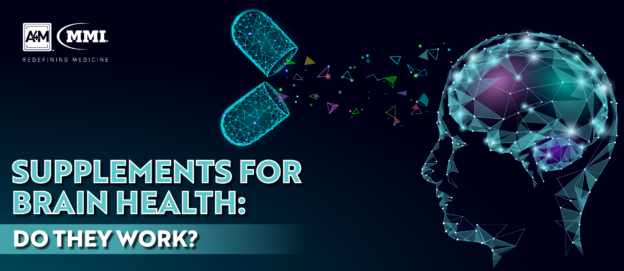In recent years, the medical community has witnessed increased interest in the area of brain health, with heightened research efforts directed at uncovering the complexities of neurological disorders and methods of prevention. Correspondingly, the U.S. dietary supplement market has experienced tremendous growth, accounting for more than $40 billion in retail sales of over 85,000 different supplement products in 2018. Now a multi-billion-dollar industry, the brain health supplement market doubled its sales between 2006 and 2015 and continues its upward trajectory both globally and within the United States.
The phenomenon of brain-health supplements exhibits the most popularity among older populations with 69% of Americans aged 50 and older consuming such supplements three times a week, according to a recent AARP survey. The vast majority (81%) of older surveyed adults believe dietary supplements to be at least somewhat important for overall health, while 49% of participants over the age of 50 mistakenly believe dietary supplements are FDA-regulated.
Despite the growing popularity of brain health supplements and other dietary health products, their efficacy is questionable with little clinical evidence supporting the benefits of their use. Hoping to elucidate the gaps in medical knowledge, disprove commonly held misconceptions, and share evidence-based recommendations for supplement use, the Global Council on Brain Health (GCBH) recently published an extensive report assessing the function of brain health supplements.
The Truth Behind Brain Health Supplements
Titled “The Real Deal on Brain Health Supplements: GCBH Recommendations on Vitamins, Minerals, and Other Dietary Supplements”,the report presents an evidence-based review of current efficacy data on brain health supplements. GCBH members including scientists, physicians, scholars, and policy experts from around the globe examined the evidence behind the consumption of dietary supplements for cognitive function in aging individuals. Ultimately, the panel of experts concluded that it could not endorse any supplement formulation, ingredient, or product designed for brain health and advised older adults against the use of these supplements as preventative methods against neurological disease.
In their examination, investigators analyzed clinical evidence related to popular dietary supplements – alongside those marketed specifically for brain health – published in peer-reviewed journals. Researchers examined data related to the eight B vitamins, vitamins D and E, as well as omega-3 fatty acids, medium-chain triglycerides, nicotinamide riboside, and a host of other ingredients claimed to elicit neuroprotective action. After a thorough review, the GCBH concluded that it could not endorse any brain health supplements based on a lack of evidence of their value; it emphasized the fact that scientific claims do not support the use of any supplement to prevent, slow, reverse, or stop cognitive decline, dementia, or other neurologic disorders.
“This report is an important effort to address the issue of people confusing some of the real evidence on how they might achieve brain health through lifestyle interventions vs the perceived value of these supplements,” said study author Howard M. Fillit, MD, Mount Sinai Hospital.
Lack of Regulation: Safety, Quality, and Efficacy
While nearly half of American adults believe that the safety and efficacy of dietary supplements are regulated by the FDA, these products are sold without premarket review and often boast unsupported claims. In general, most nations prohibit the sale of products with unsafe ingredients however, the GCBH was unable to identify a single country that regulated or evaluated dietary supplements for efficacy before they reached the market. As AARP surveyed adults claim effectiveness and safety as their top concerns about health products – valued at 76% and 71% respectively – yet continue to consume them frequently, the GCBH investigation provides much-needed education on the actual nature of supplement regulation.
Furthermore, the quality of ingredients has been found to vary widely in supplement formulations. Although 76% of survey participants report purity as their primary concern, ingredients are not generally reviewed for purity before being sold and can potentially contain harmful compounds.
The Exception: Nutritional Deficiency
According to the report, even the few well-researched health supplements provide no neurological benefit in individuals with normal nutrient levels. However, the use of specific nutrient supplements for the remediation of an identified nutritional deficiency – such as vitamin B12 or B9 deficiencies – is the key exception. As such deficiencies have been linked to cognitive issues, the use of physician-approved supplements may have a positive effect on brain health.
In addition, small-scale research has shown cognitive function improvement in individuals with mild cognitive impairment after 12 months of DHA supplementation. Save for individuals with these two conditions, the use of brain health supplements reveals no neurologic benefit in healthy adults.
Despite the concerning lack of evidence regarding the effectiveness of dietary products for brain health, manufacturers continue to market these products while consumers of all ages continue to purchase and consume them. The GCBH expresses significant concerns about the safety, quality, and efficacy of brain health supplements, urging the public to approach the use of these products with caution.
Although dietary supplements lack scientific evidence-based effects on the brain, study authors recommend alternative methods for boosting cognitive function and health. Experts advocate against the primary consumption of nutrients through pills, advising a healthy diet instead. Maintaining a healthy lifestyle, which includes a nutrient-rich diet, may provide most individuals with the vitamins and minerals necessary to preserve brain health without the need for supplementation.

